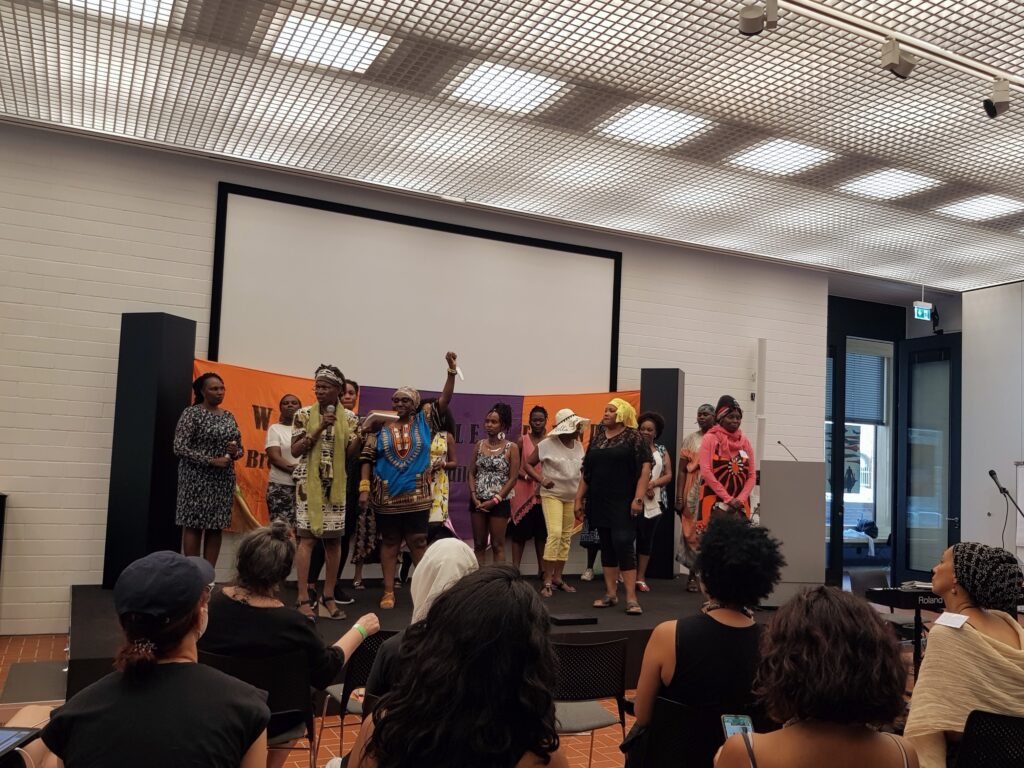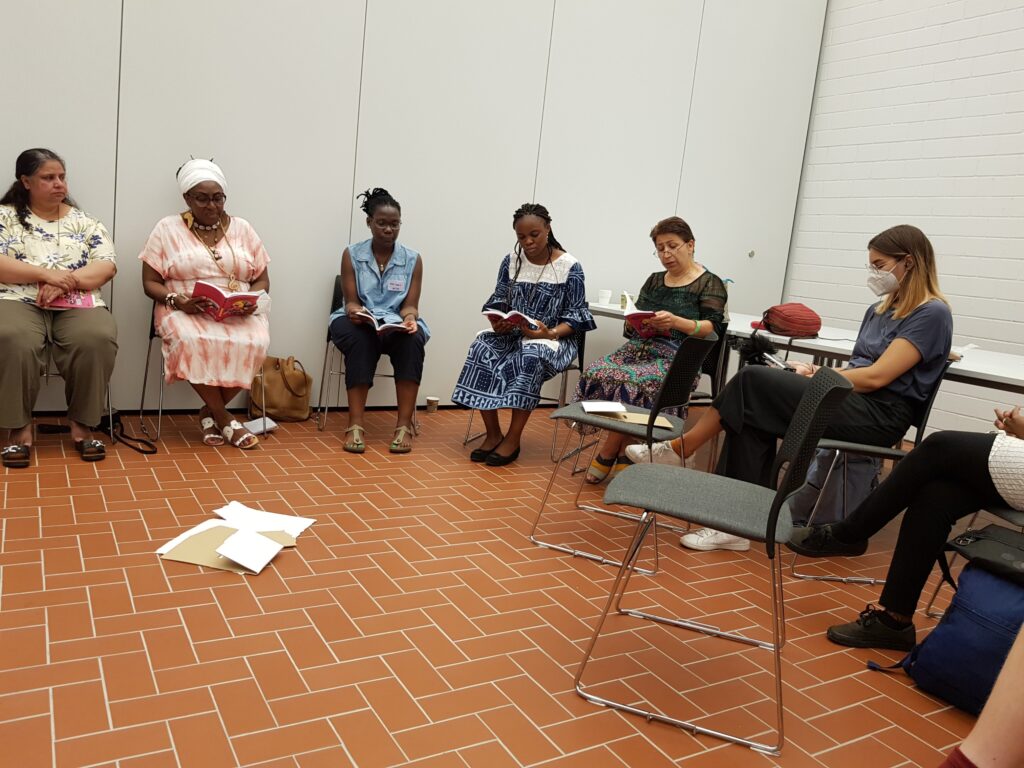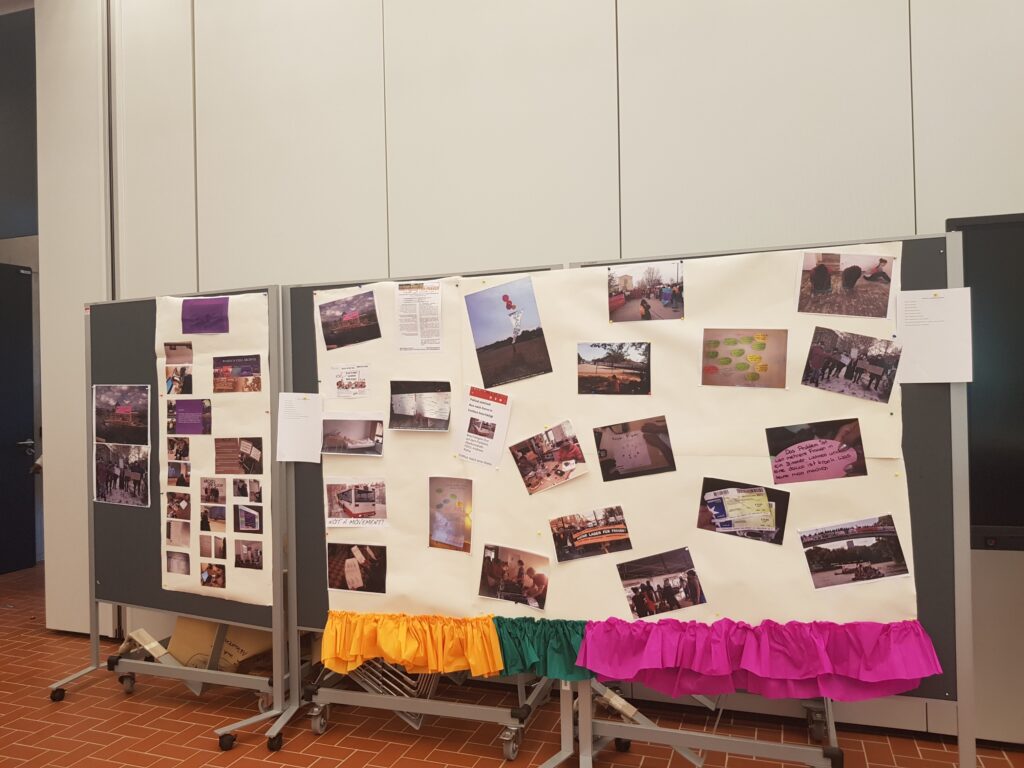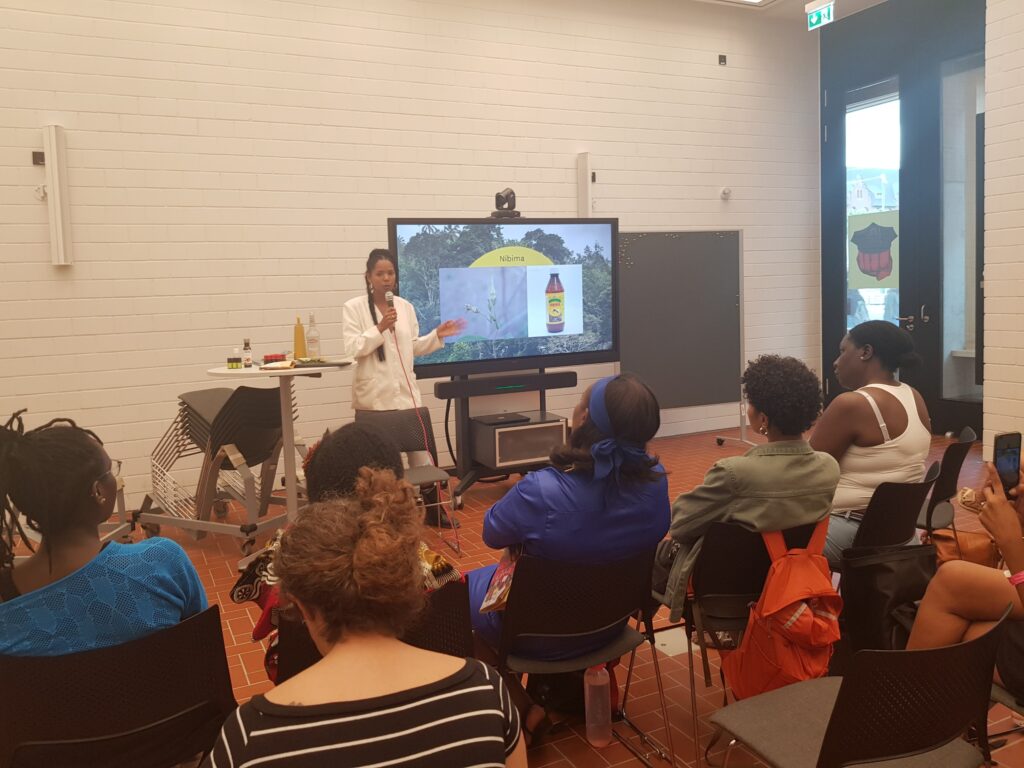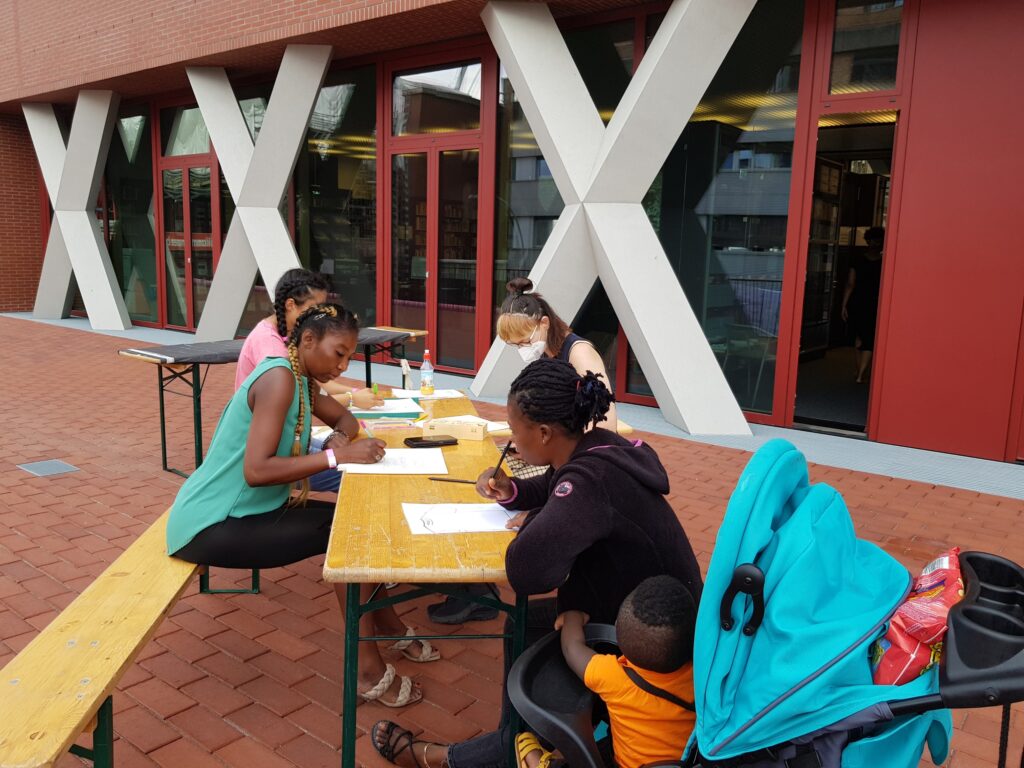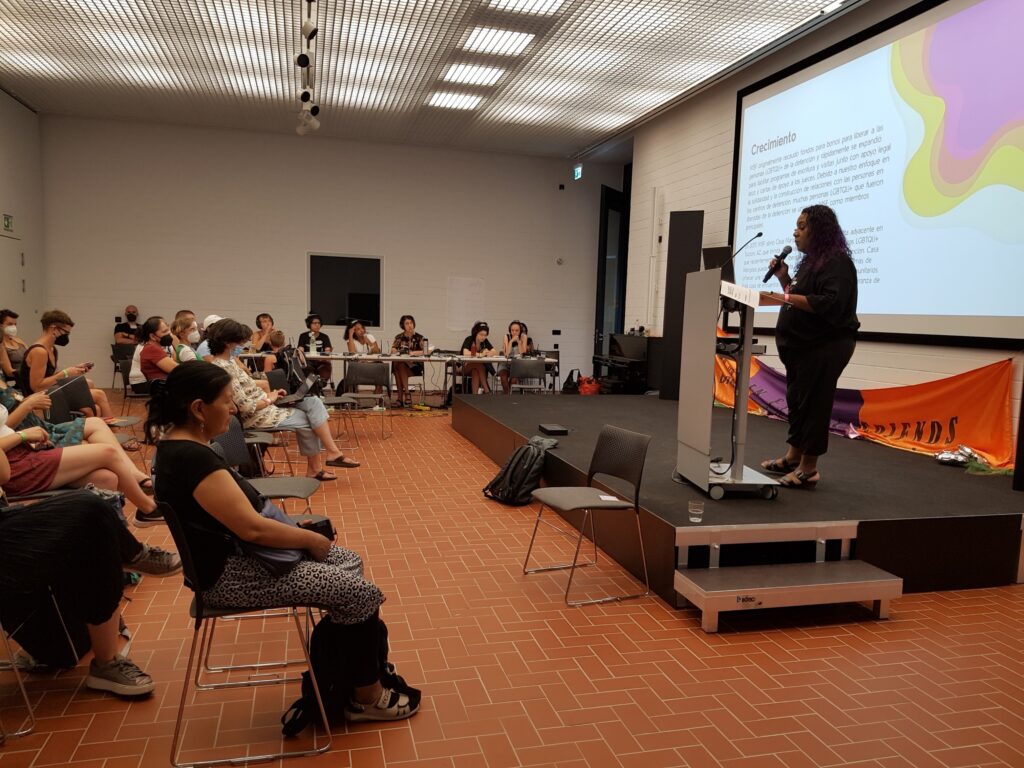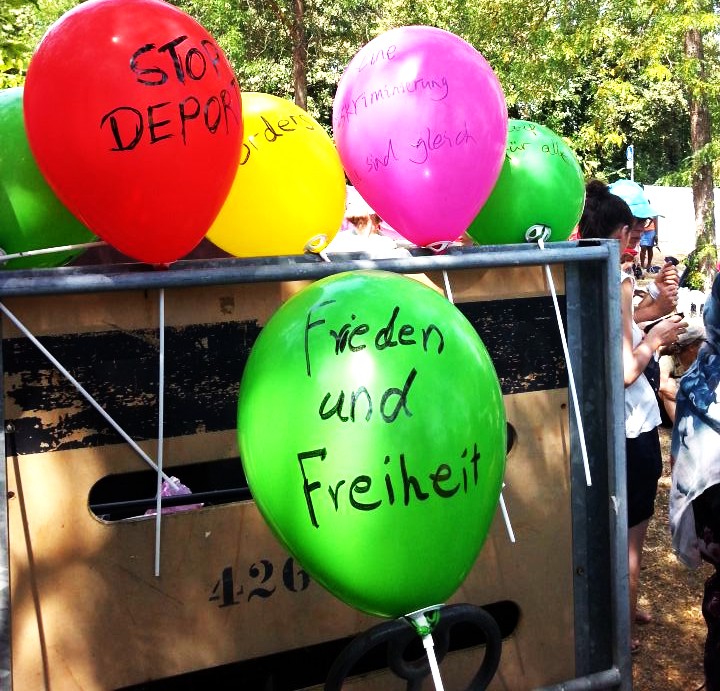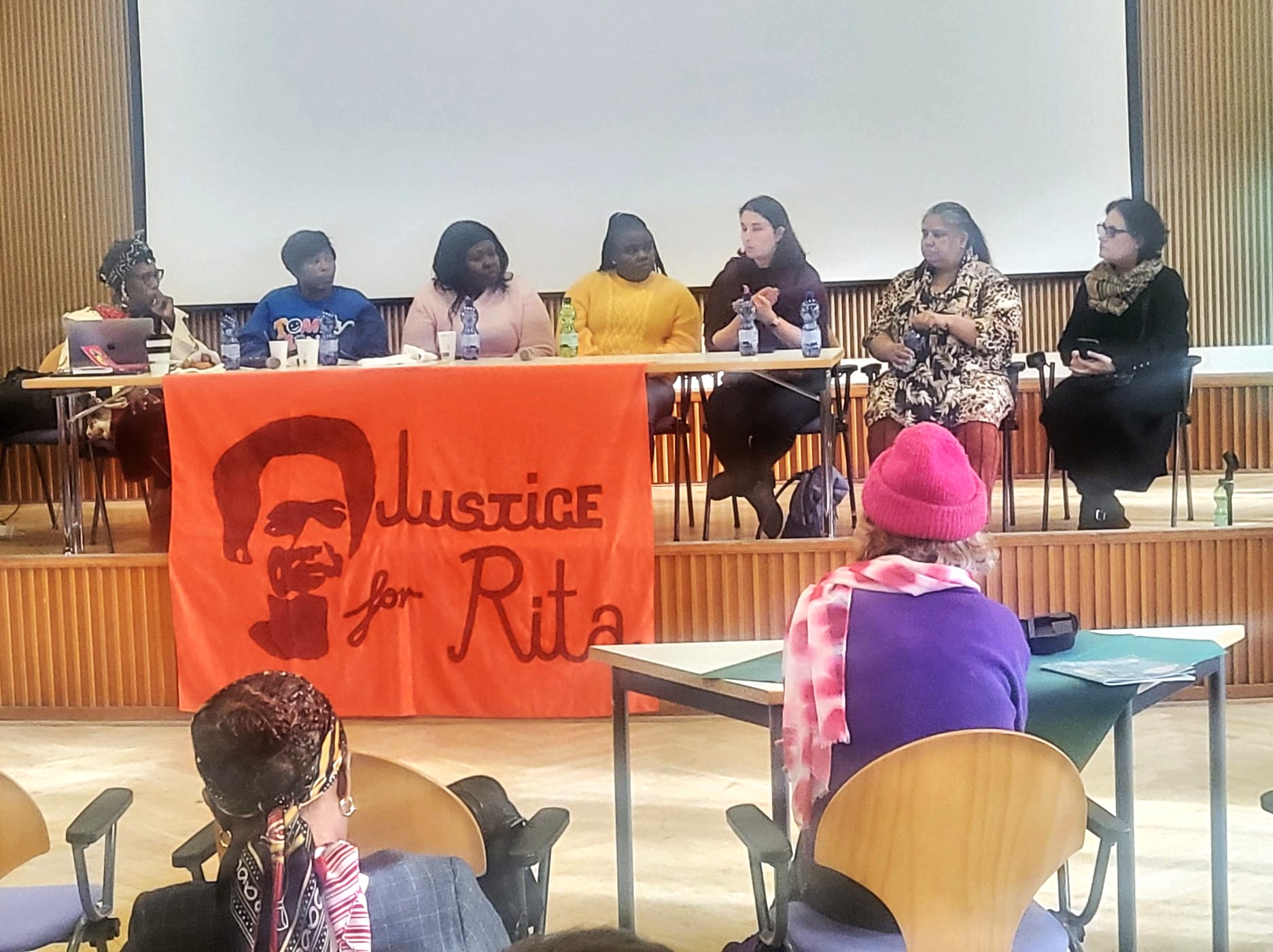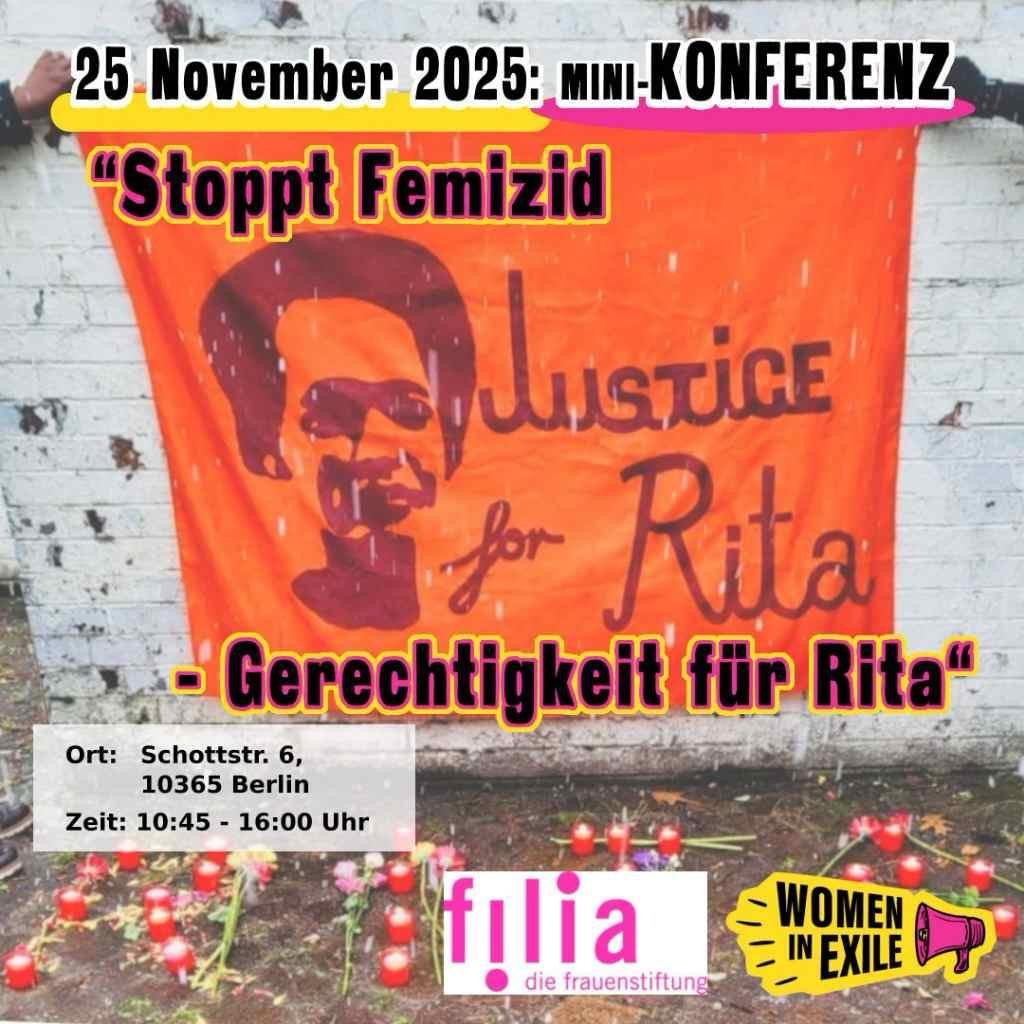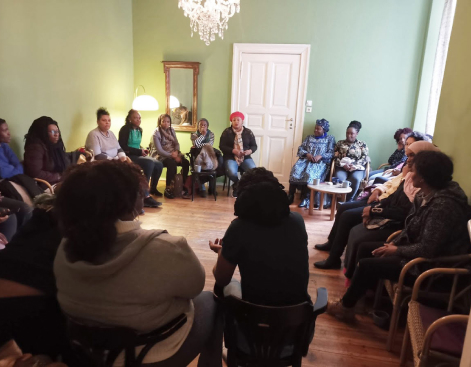We kicked off our International conference “Breaking Borders to Build Bridges” with an opening ceremony on the 4.8.2022 in the Rosa Luxemburg Stiftung Berlin with a powerful performance and singing of our freshly formed interreligious choir. In attendance were national and internal guests, overall 250 women* and children. The International conference carried a lot of activities and thus had to be of the same magnitude. The event was meant to celebrate 20 years of Women in Exile and the launching of our collectively self-written book by both women in exile & friends and supporters.
For the whole conference, Women in Exile & Friends had planned different themes for the workshops. We had workshops geared towards gender-specific reasons to flee; exploitation, marginalization and violence.
In a panel discussion with activists from our networks from IWS, Flit* Solidarity Africa, Respect and activists from WIE Rostock and WIE, the topic was: “What does it mean to live with insecure residence or without papers?” Experiences were shared and suggestions for solutions were discussed.
In another panel discussion, women from Afghanistan and Ukraine talked about war and women. The difficulties women in these countries go through and all the countries experiencing war, for example, Jemen. Women are the ones who are mainly affected by wars. They experience multiple suffering as victims of military aggression and are important part of civil resistance: as displaced people, key workers (in healthcare, for example), volunteers, community leaders, fundraisers, combatants, and campaigners. The experiences of women from Iran were also shared on this panel.
On the theme of Solidarity and Praxis, we had Florence Sissako give a workshop on what solidarity is and how it is experienced in daily life. Florence also facilitated the reading of our book “Breaking Border to Build Bridges”. In this theme, we had book reading sessions from our newly published book which tells not only the different reasons for fleeing and migration but also the experiences while on the way. It also served as an opportunity to bring out the difficulties experienced by the women within the asylum system and can be used to educate people without asylum background.
Topics on the right to asylum, a workshop from the lawyer Barbara Wessel and counselling from the Refugee Law Clinic, were a highlight for the refugee women. Barbara Wessel had to answer lots of collective questions, while the Refugee Law Clinic gave counselling to individual refugee women.
Karolina Lopez Barrera from Casa Mariposa in AZ (USA) gave a workshop on the difficulties and violence experienced by LGBTQ I+ migrants and refugees and why they offer safe housing for them. Karolina also spoke under the theme of Gender perspectives where she gave her own experience as an Afro-Latin American transwoman and why she now fights for the rights of LGBTIQ especially those without papers.
Another main topic was Climate crisis and contested territories – political, ecological, economic and cultural reasons for displacement and forced resettlement. We had speakers from IMPACT Kenya (Elizabeth Silakan and Laissa Kaunga) who showed a film on YouTube titled “Exiled in Tradition”. This was under the topic of migration due to climate crisis and their ongoing fight for the rights of nomadic women in Northern Kenya. They also talked about their fight against female genital mutilation and gender-based violence.
Our guest from Reach-Out, Sanchita Basu spoke on the topic: “We are not alone. How can we overcome racism together?”
The topic of racism was also thematised by Marianne Ballé from PAWLO: “What is empowerment – If we consider racism from a Pan-African and intersectional perspective?”
Isis Amador Campusano and Ruth Pion Vizcaino from the Junta de Prietas in the Dominican Republic spoke in their workshop on Racism as an historical continuity in the Dominican Republic, touching on Colonialism, Nationalism and Migration.
Part of the Praxis topic was the Aquerpamiento/traditional healing for political refugees and migrants. With fleeing and migration comes different problems suffered by the body; leading to physical, mental and political exhaustion. The workshop was a way to educate the women and the different traditional methods we can use to heal ourselves and our bodies.
Part of the Praxis theme was also interreligious conversation and empowering singing. Our workshops were not only about sitting and learning, but also gave space to have some fun and be creative. With this, we had the workshop “Empowerment Shirts”, where we printed our shirts and bags. This was facilitated by the artist Patricia Vester in cooperation with the Autonomous Women’s Centre Potsdam e.V. /KOMPLIZIN*.
On Saturday, most of the workshops were health oriented. We had different workshops led by different speakers. One of them was, the “Decolonial Plant Knowledge” where Rebecca Abenna Kennedy-Asante taught us about the different plants which can be used for healing. This workshop was open to BIPOC only.
The second was called Casa la Serena with speakers Nallely Tello Mendez and Anamaria Hernandez Cardenas from Mexico who spoke about the temporary sanctuary in Mexico (Oaxaca) which is for recovery, healing, and rest for human rights activists, who are in situations of extreme tiredness, and emotional or physical exhaustion.
Under the theme collective Experience and group processes, we had Women in Exile & Friends present their ongoing Archive project and also talk about the importance of the group archiving their work themselves.
Under the theme of Women’s movements and feminism from the Global South, we had two workshops. One was given by Carolina Garcia Catano, who is based in Senegal. Unfortunately, she had tested positive for Covid 19. Regardless, the workshop was still given via Zoom. Their topic was free technologies for women empowerment. They talked about the current project they had about educating women in technology. Since they needed to be self-sufficient, they have started another project where they own and run a restaurant. The money from the restaurant is then used for the initial project.
Another workshop on the same theme was Territorial and communal feminism* given by Chahim A’jam Vasquez Leal from “La red de Sandoras Ancentrales del Feminismo Comunitario en lximulew” from Guatemala. She spoke on territorial feminism* that was developed in 2003 by indigenous Mayan and Xinka women*.
Under the theme of Gender perspectives, FLINTA*STADT facilitated a workshop, where we build a model of a patriarchal free city. This city was build, taking into account, what we need to be able to live and enjoy our freedom together, and the structures needed so that people are not marginalized. In the end, we had a model city with different amenities which could relate to everyone.
On Friday and Saturday, we had podium discussions in the evening with the speakers of the day where they discussed the central aspects of the day. On Friday the topic was Reasons to flee and the struggles of FLINTA/women*. On Saturday, the topic was Self-care and health practices.
We closed with a ceremony with the interreligious choir and the question: How can we continue to build an international network? Finally, those who were not travelling joined us in a Demo in front of the Humboldt Forum against colonialism.
Our International Conference would not have been able to run as smoothly as it did, were it not for all the support that we got from our networks. We had the support of Medibüro with the Covid-Testing. Then the Sleeping Place Organisation was supported by IL, live translations into the 5-6 different languages was present during the whole conference. Childcare was provided by KIKO during each day’s activities, thus allowing the parents to fully take part in ongoing discussions. There was also an information table, ensuring there was always someone on hand to help when needed.
As the conference was international, it also brought forth different cultures and allowed its exchange. This was particularly seen during meal times since each meal was a different cuisine cooked by Women in Exile and Friends and our supporters.
The party was another highlight for those who still had the energy on Saturday night to dance and continue with the celebration.

